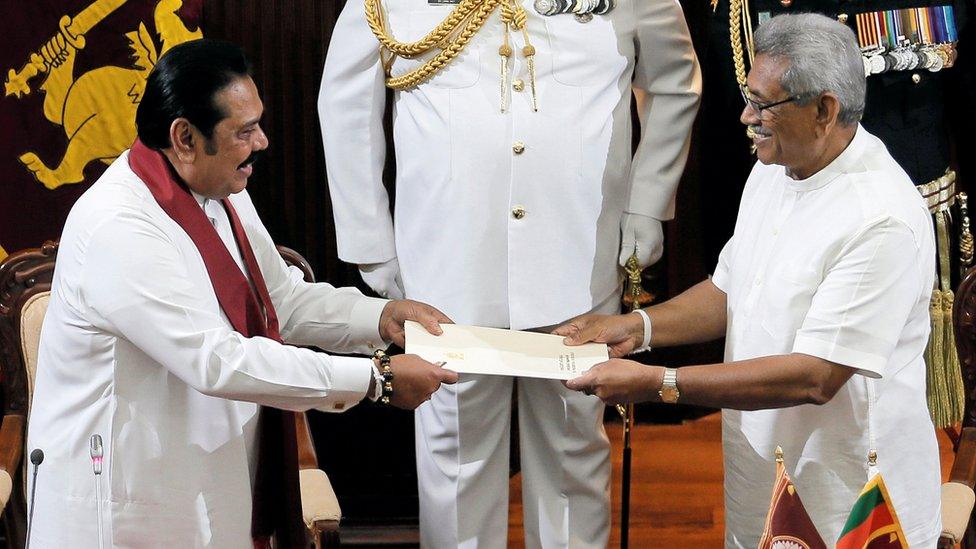Sri Lanka Rajapaksas: Return to power for wartime leader brothers
- Published

The brothers, Gotabaya and Mahinda, now hold Sri Lanka's most powerful positions
Sri Lanka's new president has sworn in his brother as interim prime minister, a remarkable return to power for the siblings who oversaw the brutal end to the island's civil war 10 years ago.
Mahinda Rajapaksa took the oath as PM at a brief ceremony in Colombo.
His younger brother Gotabaya was voted in as president on Sunday and has said he wants to rule for all Sri Lankans.
But rights groups are concerned - wide-scale abuses were documented when the Rajapaksas were last in power.
Mahinda was president from 2005-2015, but was barred from standing again by a two-term limit, while Gotabaya was his all-powerful defence secretary. Both men deny any wrongdoing.
The election was Sri Lanka's first since the deadly Easter Sunday attacks shattered a decade of relative calm - and security was a key issue.
Militants linked to the Islamic State group targeted churches and high-end hotels across the island in April, killing more than 250 people.
What is the Rajapaksa legacy?
The brothers spearheaded the crushing defeat of separatist Tamil Tiger (LTTE) rebels in 2009, ending a decades-long war in which abuses were committed on both sides and at least 100,000 people were killed.
How the army finally crushed Tamil Tiger rebels after 25 years of bloody war
During its final stages, thousands of people disappeared - many are said to have been tortured or killed. There were numerous accounts of surrendering LTTE forces being killed even while waving white flags, or after being taken into custody. The video evidence of this is compelling, despite the government's strenuous denials.
The enforced disappearances continued into the years after the war ended, when businessmen, journalists and activists seen as opponents of the Rajapaksas were rounded up and never seen again.
The Rajapaksa government denied any role in the disappearances. Earlier this year, Gotabaya Rajapaksa told the BBC that war crimes allegations against him were "baseless" .
To this day Tamil widows and family members protest in an effort to draw attention to the fate of relatives who disappeared during the war.
Who backs the Rajapaksas?
The devastating Easter attacks destroyed the sense of hard-won calm - and many voters were won over by Gotabaya Rajapaksa's reputation as a tough defence chief.
The previous government had been forced to admit it had suffered a "major intelligence lapse" after failing to adequately share information from Indian intelligence officials about a potential attack.
But mob reprisals and hate speech since Easter against the Muslim minority have left many of them fearful and the substantial Tamil minority is still mistrustful of the new president. Gotabaya Rajapaksa's comfortable margin of victory is thanks in large part to support from Sinhalese Buddhists.
The majority (about 75%) of Sri Lanka's population of 22 million are Sinhalese and the vast majority of those are Buddhist. Tamils - both Hindu and Christian - as well as Muslims are substantial minorities.
The north and eastern provinces overwhelmingly rejected Mr Rajapaksa. These regions are dominated by Tamil, Hindu and Muslim populations who broadly supported his opponent, Sajith Premadasa.
This split in the vote has raised fears for reconciliation in a country polarised along ethnic and religious lines.

More about Sri Lanka and the Easter Sunday bombings

What's at stake?
Many minority voices do not think the signals so far are encouraging.
Gotabaya Rajapaksa wasted little time in releasing a statement saying he would be a leader for all those who voted for him as well as those who did not. But at his own swearing-in he made clear he was disappointed he hadn't got the "support he expected" from the minorities.
"I always knew I only required the vote of the Sinhalese to win. Yet, I made a made a special plea to Tamil and Muslim minorities to be a part of my inevitable victory. I did not expect this level of rejection."
He began his campaign from the ancient capital of Anuradhapura and chose to be inaugurated at Ruwanwelisaya, an ancient temple located in the city. It's an important monument for many Buddhists.
There are also renewed fears about the robustness of Sri Lanka's democracy.
It now looks likely the government will push to revoke the 19th amendment to the constitution. It places a two-term limit on the presidency - and bolstered independent commissions that could investigate the police, judiciary and the civil service, as well as human rights, although little progress was made on the last front.
Parliamentary elections are due next year - or could be called earlier - and the Rajapaksas hope to secure the two-thirds majority they would need to change the constitution.
Separately, corruption charges against Gotabaya Rajapaksa have also been dropped as a result of the immunity from prosecution he acquires as president. He'd been indicted by a special High Court set up by the former government, charged with siphoning off state funds.